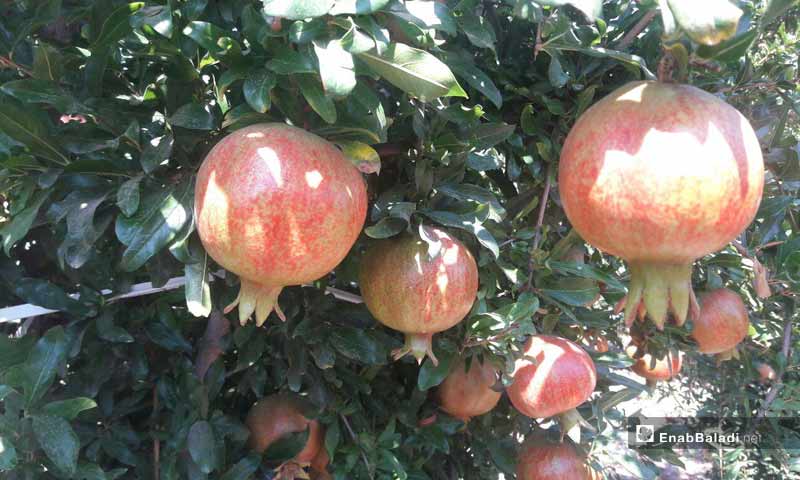



Despite the recovery the agricultural sector is witnessing in southern Syria, the cotton aphid is yet threatening the pomegranate season in Daraa and increasing production costs, for, unlike the previous years, aphid infestation’s spread is marked.
The farmer Waseem al-Mohammed, 45 years old, told Enab Baladi that he noticed some white spots on pomegranate fruit and leaves, and after pomegranate was diagnosed by a specialized engineer, it became clear that the crop is infected with the cotton aphid.
According to the engineer, who asked not to be named for security reasons, aphids can be eliminated in pomegranate crops using insecticides.
The farmer complains about the low concentration of active chemical ingredients in the conventional insecticides used to eliminate the insect; however, the engineer believes that the available insecticides are effective against aphids that threaten the pomegranate seasons.
The engineer added that there are two reasons for the insect’s spread this season: the first reason is the high humidity in the air, backed by excessive moisture in the soil, because pomegranate orchards require frequent watering, unlike other crops. The second reason is the density of the trees, which prevents sunlight from reaching all the leaves.
“During our visits to the pomegranate crops, we have realized that the proliferation of the aphid infestation is under control and its severity varies among trees, depending on the care provided to the pomegranate trees and crop watering,” the engineer indicated, pointing out that that the concentration level in the pesticides is good, but the infection is a general phenomenon this season.
Nevertheless, the engineer did not deny that aphids are a threat to the pomegranate season, especially as it eliminated the cactus season in the area the last year. The cotton aphid is a scale insect that feeds on tree stems and leaves, destroys the crop and reproduces rapidly. Aphid is called the “scarlet worm” and differs from the insect that attacks other trees.
Cotton aphid control increases farmers’ expenditures and their burden as well, particularly after the rise in the prices of fuel and pesticides, for pesticides spray and the equipment required has also become expensive.
Further, Moataz al-Hourani, a farmer in the Tafas area, stressed that one pesticide spray with a capacity of 1000 liter costs about 20,000 Syrian pounds, the price of the chemicals, and five thousand pounds for the “sprinklers”, in addition to paying the salaries of specialized workers. As a result, the total cost of one spray is 27,000 pounds for an area not exceeding five dunums of cultivated land.
Moreover, Motaz, 30 years old, told Enab Baladi that “we intensified spraying this year. We got to spray the crop every 15 days which is too costly although we use spraying remedial pesticides without adding any drugs or fertilizers.”
The cotton aphid is controlled through spraying the infected crops with a special chemical called Dangl, Morel, or Lentrac. In fact, Morel is the most widely used medicine among Daraa farmers, according to agricultural engineers in the area.
In Daraa, most of the cultivated pomegranate is classified as belonging to the French variety, characterized by its ability to withstand all storage conditions in the ground freezers, which boosts demand on the crop when the season is over.
Daraa farmers look forward to a good season, hoping to make up some of their losses, by storing the crop until winter comes, taking advantage of the high price, in addition to feeling optimistic about exporting pomegranate through the Nasib border crossing with Jordan.
The farmer Motaz al- Hourani expects pomegranate prices to rise this year if exported to Jordan, Iraq and Lebanon, which may compensate farmers for their losses.
“Opening export routes to Iraq, Lebanon and Jordan leaves the farmer with a choice; either to bring his crop to the market where the prices might be higher after export has been reactivated, let it be within the country or to different countries, or sell the pomegranates harvest, while the fruit is yet on the trees, to merchants who buy the crop to store it in refrigerators,” Motaz manifested.
Moreover, opening the crossings also saves farmers from the monopoly on the prices of pomegranate held by merchants, according to the farmer.
Pomegranate cultivation in Daraa has spread widely over the past years, at the expense of grape cultivation that diminished in the area due to the upheavals witnessed by the province during the war and its impact on its cultivation, especially as pomegranates are more resistant to diseases and natural factors.
The Syrian Government’s Directorate of Agriculture estimates that pomegranate production in Daraa province in 2015 is about 1500 tons, with a cultivation area of 200 hectares. The pomegranate cultivation is concentrated in the areas of Tell Shihab, Zizoun, al-Muzayrib, al-Ajmi, Jalin, Dael, Tafas and most of the western areas of Daraa.
As Daraa farmers moved towards the cultivation of pomegranate at the expense of grapes and olive in the past years, the number of pomegranate trees in the province is estimated at 700,000 trees, producing approximately 35,000 tons in 2018, according to the Syrian Arab News Agency (SANA).
if you think the article contain wrong information or you have additional details Send Correction